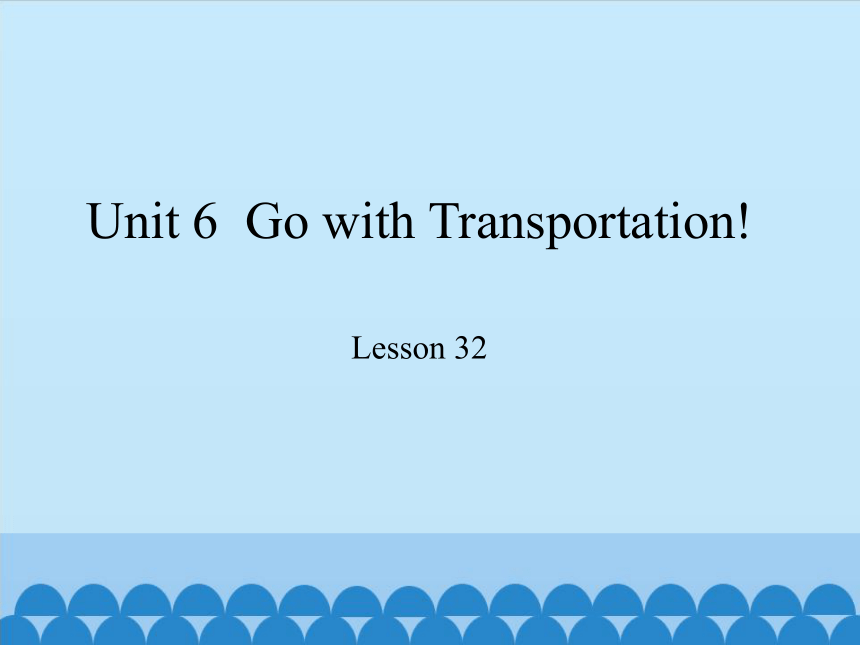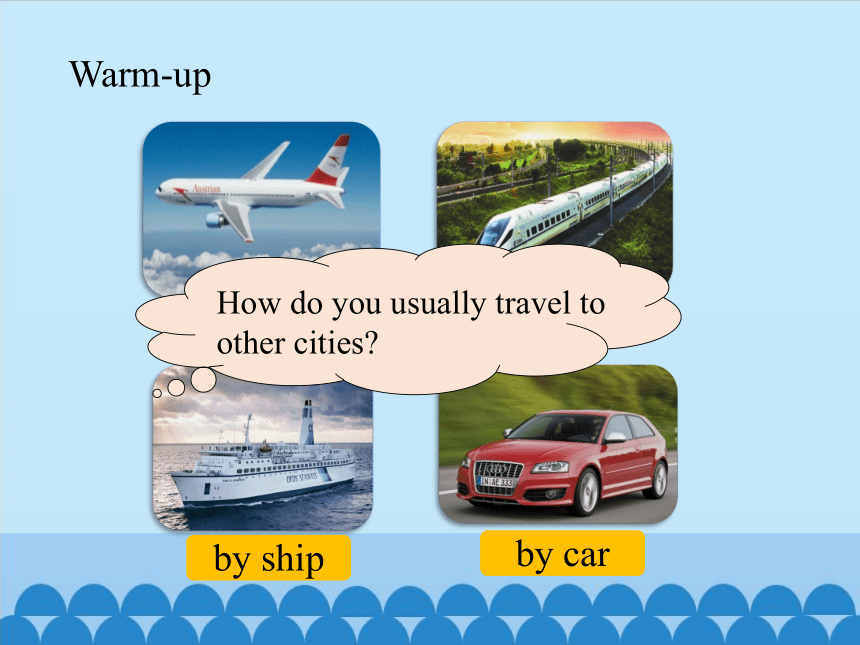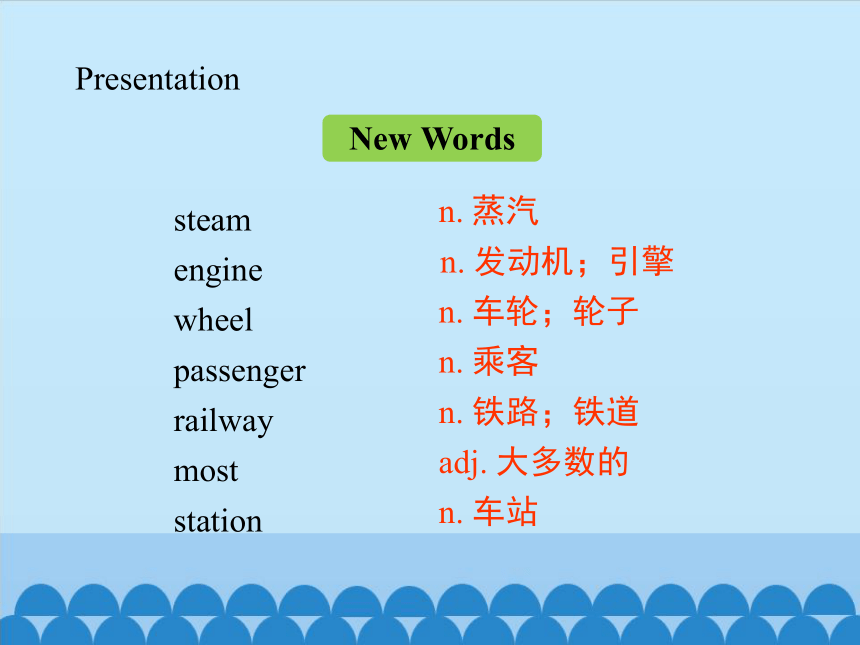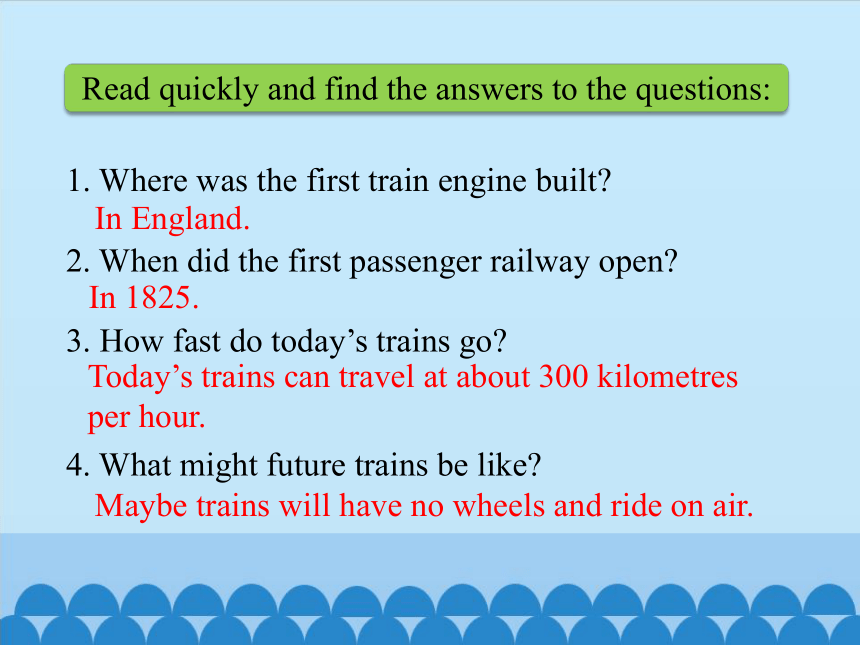冀教版八年级上册Unit 6 Go with Transportation! Lesson 32 课件(共14张PPT)
文档属性
| 名称 | 冀教版八年级上册Unit 6 Go with Transportation! Lesson 32 课件(共14张PPT) |

|
|
| 格式 | pptx | ||
| 文件大小 | 1.6MB | ||
| 资源类型 | 教案 | ||
| 版本资源 | 冀教版 | ||
| 科目 | 英语 | ||
| 更新时间 | 2022-10-10 20:44:25 | ||
图片预览







文档简介
(共14张PPT)
Unit 6 Go with Transportation!
Lesson 32
1.熟记本课的单词、短语及重点句子。
2.掌握世纪、年代和速度的表达方式。
3.了解火车的发展进程。
Warm-up
by train
by plane
by ship
by car
How do you usually travel to other cities
Think About It
Talk about your first time taking a train.
Presentation
New Words
steam
engine
wheel
passenger
railway
most
station
n. 蒸汽
n. 发动机;引擎
n. 车轮;轮子
n. 铁路;铁道
n. 乘客
adj. 大多数的
n. 车站
New Words
easily
standard
speed
per
get on/ off
steam engine
adv. 容易地
n. 标准;规格
n. 速度
上/下(车)
prep. 每;通过
蒸汽机
Read quickly and find the answers to the questions:
1. Where was the first train engine built
2. When did the first passenger railway open
3. How fast do today’s trains go
4. What might future trains be like
In England.
In 1825.
Today’s trains can travel at about 300 kilometres per hour.
Maybe trains will have no wheels and ride on air.
Language Points
1. In the 1760s, a scientist in England found a way to put steam engines and wheels together.
在18世纪60年代,在英国的一位科学家找到了把蒸汽机和轮子结合在一起的方法。
(1) in the 1760s 意为“在18世纪60年代”。
(2) a way to do sth. 意为“做某事的方法”,也可以用a way of doing sth.来表示。
(3) put ... together “把……放在一起”。
2. In 1804, the first train engine was born in England. 在1804年,第一辆蒸汽火车产生于英国。
be born “出生;产生;形成”。
born是bear的过去分词。
3. work on sth. 从事于…
4. all over the world=around the world 世界各地
Pair Work
What do you know about the railways in China
What is the speed of the trains in China
Which do you like better, a high-speed train or a low-speed train Why
Exercise
一、根据汉语或首字母提示写出单词:
1. The car has four ______ (车轮).
2. He often drives at a top s______ on his way home.
3. They have rented(租赁) this house for 2,000 yuan p____ year.
4. This bus is crowded with _________ (乘客) on such a snowy morning.
5. The ______ (发动机) can’t start. There is something wrong with it.
wheels
peed
er
passengers
engine
二、根据汉语提示完成句子:
1.这座房子是石头建成的。
The house ______ ______ ______ stone.
2.这些发明都是20世纪80年代发明的。
These inventions were all produced
______ ______ ______.
3.你听说玛丽昨天晚上发生什么事了吗?
Did you hear ______ _________ ____ Mary last night
what happened to
is made of
in the 1980s
1. Recite the words and phrases.
2. Work in pairs and talk about what might future trains be like.
Homework
Thank You
Unit 6 Go with Transportation!
Lesson 32
1.熟记本课的单词、短语及重点句子。
2.掌握世纪、年代和速度的表达方式。
3.了解火车的发展进程。
Warm-up
by train
by plane
by ship
by car
How do you usually travel to other cities
Think About It
Talk about your first time taking a train.
Presentation
New Words
steam
engine
wheel
passenger
railway
most
station
n. 蒸汽
n. 发动机;引擎
n. 车轮;轮子
n. 铁路;铁道
n. 乘客
adj. 大多数的
n. 车站
New Words
easily
standard
speed
per
get on/ off
steam engine
adv. 容易地
n. 标准;规格
n. 速度
上/下(车)
prep. 每;通过
蒸汽机
Read quickly and find the answers to the questions:
1. Where was the first train engine built
2. When did the first passenger railway open
3. How fast do today’s trains go
4. What might future trains be like
In England.
In 1825.
Today’s trains can travel at about 300 kilometres per hour.
Maybe trains will have no wheels and ride on air.
Language Points
1. In the 1760s, a scientist in England found a way to put steam engines and wheels together.
在18世纪60年代,在英国的一位科学家找到了把蒸汽机和轮子结合在一起的方法。
(1) in the 1760s 意为“在18世纪60年代”。
(2) a way to do sth. 意为“做某事的方法”,也可以用a way of doing sth.来表示。
(3) put ... together “把……放在一起”。
2. In 1804, the first train engine was born in England. 在1804年,第一辆蒸汽火车产生于英国。
be born “出生;产生;形成”。
born是bear的过去分词。
3. work on sth. 从事于…
4. all over the world=around the world 世界各地
Pair Work
What do you know about the railways in China
What is the speed of the trains in China
Which do you like better, a high-speed train or a low-speed train Why
Exercise
一、根据汉语或首字母提示写出单词:
1. The car has four ______ (车轮).
2. He often drives at a top s______ on his way home.
3. They have rented(租赁) this house for 2,000 yuan p____ year.
4. This bus is crowded with _________ (乘客) on such a snowy morning.
5. The ______ (发动机) can’t start. There is something wrong with it.
wheels
peed
er
passengers
engine
二、根据汉语提示完成句子:
1.这座房子是石头建成的。
The house ______ ______ ______ stone.
2.这些发明都是20世纪80年代发明的。
These inventions were all produced
______ ______ ______.
3.你听说玛丽昨天晚上发生什么事了吗?
Did you hear ______ _________ ____ Mary last night
what happened to
is made of
in the 1980s
1. Recite the words and phrases.
2. Work in pairs and talk about what might future trains be like.
Homework
Thank You
同课章节目录
- Unit 1 Me and My Class
- Lesson 1 Back to School!
- Lesson 2 Many Faces, One Picture
- Lesson 3 Getting to Know You!
- Lesson 4 Best Friends
- Lesson 5 Meet Ms. Liu
- Lesson 6 Jenny's Week
- Unit 2 My Favourite School Subject
- Lesson 7 Don't Be Late for Class!
- Lesson 8 E-mail Helpers!
- Lesson 9 I Don't Want to Miss Geography !
- Lesson 10 Looking for Lisa
- Lesson 11 Lily Learns about China !
- Lesson 12 Karen's Hair Stood Up!
- Unit Review
- Unit 3 Families Celebrate Togethe
- Lesson 13 I Love Autumn
- Lesson 14 Happy Memories
- Lesson 15 A Present for Li Ming!
- Lesson 16 Happy Thanksgiving!
- Lesson 17 Presents from Canada!
- Lesson 18 Li Ming's Birthday
- Unit Review
- Unit 4 My Neighbourhood
- Lesson 19 The Best Neighourhood
- Lesson 20 No Stopping!
- Lesson 21 Eat a Donut and Turn Right
- Lesson 22 I Like My Neighbourhood
- Lesson 23 People in My Neighbourhood
- Lesson 24 I Need a Map!
- Unit Review
- Unit 5 My Future
- Lesson 25 I Want to Be a Teacher!
- Lesson 26 What Will I Be ?
- Lesson 27 What's Your Advice?
- Lesson 28 Rich or Poor? It Doesn't Matter!
- Lesson 29 Our Ambitions and Dreams
- Lesson 30 A Famous Friend?
- Unit Review
- Unit 6 Go With Transportation !
- Lesson 31 How Do You Travel ?
- Lesson 32 Trains Go Faster !
- Lesson 33 Life on Wheels
- Lesson 34 Flying Donuts
- Lesson 35 Future Transportation
- Lesson 36 Clean Cars ?
- Unit Review
- Unit 7 Enjoy Your Hobby
- Lesson 37 What's Your Hobby ?
- Lesson 38 Hobbies Are Fun!
- Lesson 39 Danny's Hobby
- Lesson 40 What's Paul's Hobby?
- Lesson 41 Show and Tell!
- Lesson 42 The New Club
- Unit Review
- Unit 8 Celebrating Me
- Lesson 43 What Makes You Unique?
- Lesson 44 Georgia Plays Basketball
- Lesson 45 Be Yourself !
- Lesson 46 My Dream
- Lesson 47 I Made It !
- Lesson 48 Li Ming's Report
- Unit Review
